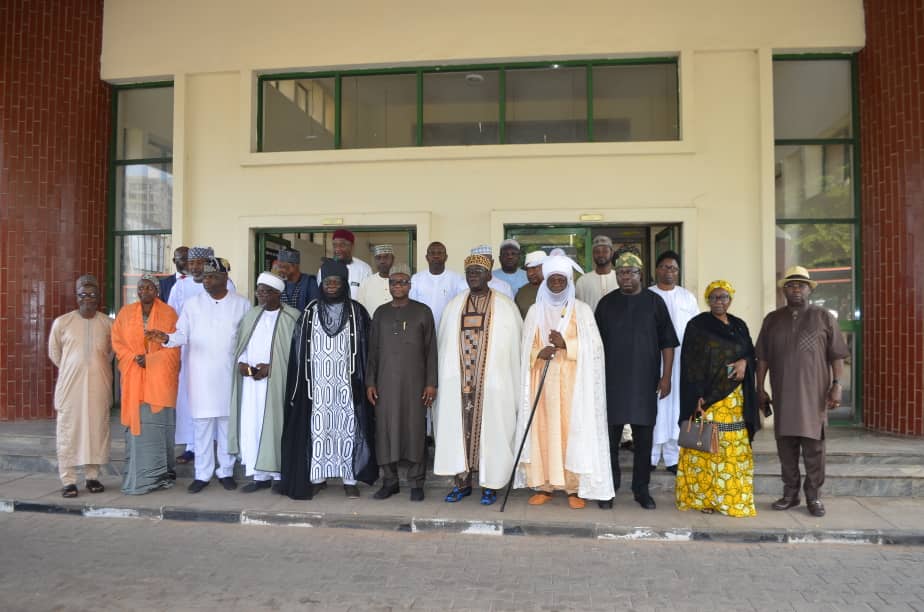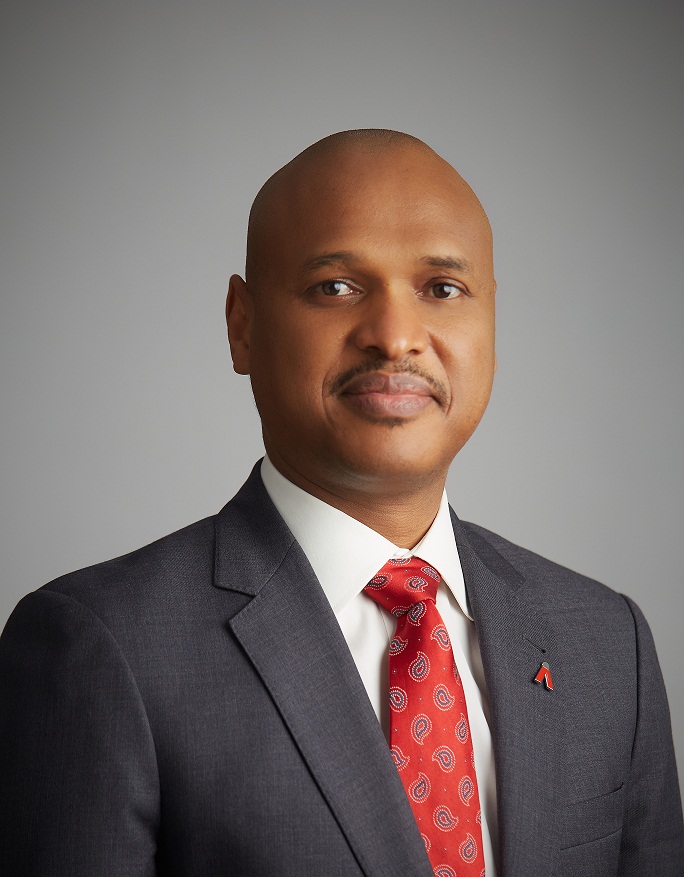Business
Traditional Council Pillars of Stability and Development – RMAFC Chairman

Joel Ajayi
Chairman Revenue Allocation Mobilization And Fiscal Commission Mohamed Bello Shehu OFR, has described the traditional rulers as not only the custodians of tradition and culture but Pillars of Stability and Development in Nigeria.
The Chairman made this remark when some traditional rulers from Nasarawa State, led by His Royal Highness Abdullahi Amegwa, the Osana of Keana paid him a courtesy visit in his office in Abuja.
He said, ” Prior to the colonial era, the system of government that existed in Nigeria was controlled by the traditional rulers in our various societies. The remarkable role they played not only as custodians of culture and traditions but also as development agents in various societies that formed what is known as Nigeria today can not be overemphasized. “
He therefore stressed the need to recognise the rightful position of the royal fathers and accord them a better role that will enable them to perform optimaly.
According to Shehu ” We did not get things right with the Local Government (LG) reforms of 1976 and we did not get it right with the 1999 Constitution of Nigeria (as ammended) but I only hope and pray that the present attempt at reforming the Constitution will place a bigger role on the traditional rulers and be able to also find a way not only to fund it but to sustain it so that they will be able to hold the society together as they have done over the years”.
Earlier, Dr. Samson Gamu Yare, the Chun Mada of Akwanga who spoke on behalf of the leader of the delegation, disclosed that the inter – face with the Commission emanated from the deliberation of the Council of Chiefs in Nasarawa State, which was endorsed by the Executive Governor, His Excellency, Engineer Abdullahi Sule .
He explained that they were in the Commission to request that the 5% of the allocation to local governments, which is constitutionally approved for traditional councils, should be deducted from the source and allocated directly to the respective traditional rulers to ensure proper accountability and compliance.
The royal father said, “Even with the improvement in statutory allocation, the 5 percent allocated to Traditional Councils has continued to experience decline and that for us is a serious concern. This called for the interface and pleading from the traditional council for the commission to consider deducting the 5% charge from the source and disbursing it to the traditional councils.
“Past experiences show that the Modus operandi of deductions where any kind of formular is applied with regard to the implementation strategy is unacceptable. “
He commended President Bola Ahmed Tinubu for the resilience and courage to identify with the grass root to ensure that the third tier of government is given its rightful place of pride following the Supreme Court ruling, which granted financial autonomy to Local governments as provided in the constitution of Nigeria.
He also congratulated the Chairman of the Commission and the Hon. Members for being found worthy to serve the Country in this capacity.
Speaking on the issue, some Members and Directors of the Commission at the occasion emphasised the need for clear a policy on the deduction and allocation of the 5% entitlement to the traditional councils.
After an exhaustive deliberation, the royal fathers were advised to formally write a letter to the Presidential Committee on Local Government Autonomy and copy the Commission for actionable recommendation to the Committee.
Other members of the delegation were His Royal Highness, Mahmoud Umar Bwalla, the Sangarin Shabu and His Royal Highness, Pham. Luka Panya Baba, the Esu Karu.
Business
TAJBank Emerges Nigeria’s Biggest Non-Interest Bank

Cyril Ogar
After five years of operations in Nigeria’s rapidly evolving non-interest banking (NIB) space, TAJBank Limited has become the biggest player in the NIB subsector based on its total assets and gross earnings values.
Disclosing this during his paper presentation on the key performance indices in the non-interest banking space over the past few years at a seminar organized by Leaders Corporate Services with the theme “Roles of Non-Interest Banks In SMEs’ Financing” for SME entrepreneurs yesterday in Abuja, an investment expert, Mr. Olabode Akeredolu-Ale, maintained that based on the non-interest banks’ approved financial statements for the half year 2025, TAJBank currently remained the biggest in terms of its total assets.
The expert, a chartered stockbroker, specifically confirmed that his recent investment researches on the NIBs and their financial performances showed that TAJBank, with its total assets rising to N1.017 trillion in half year 2025 up from N953.098 billion as of December 2024, which is about N53 billion higher than the nearest NIB’s assets, now ranked top in the banking subsector.
According to him, TAJBank’s gross earnings for H1 2025 also surged to N53.752 billion from N32.86 billion as of December 2024, representing a 64% growth, and higher than the nearest NIB’s gross earnings in the period under review.
This is even as he disclosed that on the NIBs’ earnings per share during the half year, TAJBank reported N61.36 kobo earnings per share, about 92% higher than the earnings per share of the next NIB during the period.
Akeredolu-Ale, who is also a chartered accountant, clarified: “The figures I am reeling out here on the NIBs are sourced from the banking and capital market regulatory institutions’ platforms, which anyone can access to verify.
“I am part of this event because of my research interest in non-interest banking and how the players in the subsector in Nigeria can help to leverage their competencies in innovation and ethical banking to support our MSMEs.
“Today, the MSMEs cannot access DMBs’ loans due to high lending rates and other inclement macroeconomic factors. This is where I think the NIBs have become very crucial to Nigeria’s economic growth.
“Overall, my findings on the NIBs indicated that they are all trying their best with non-interest loans to support entrepreneurs, particularly the MSMEs owners. I have advised those of them at this seminar to explore the cost-friendly financing options of the NIBs to grow their businesses by opening accounts with the NIBs”, the expert added.
Another speaker at the event, Benjamin Chukwudi, also commended the NIBs for their “catalytic roles in helping SMEs to access interest-free loans and providing them the needed financial management advisory, which have been helping them in sustaining their operations in the face of rising cost of doing business in the country.”
-

 Featured6 years ago
Featured6 years agoLampard Names New Chelsea Manager
-

 Featured6 years ago
Featured6 years agoFG To Extends Lockdown In FCT, Lagos Ogun states For 7days
-

 Featured6 years ago
Featured6 years agoChildren Custody: Court Adjourns Mike Ezuruonye, Wife’s Case To April 7
-

 Featured6 years ago
Featured6 years agoNYSC Dismisses Report Of DG’s Plan To Islamize Benue Orientation Camp
-

 Featured4 years ago
Featured4 years agoTransfer Saga: How Mikel Obi Refused to compensate me After I Linked Him Worth $4m Deal In Kuwait SC – Okafor
-
Sports3 years ago
TINUBU LAMBAST DELE MOMODU
-

 News10 months ago
News10 months agoZulu to Super Eagles B team, President Tinubu is happy with you
-
Featured6 years ago
Board urges FG to establish one-stop rehabilitation centres in 6 geopolitical zones
